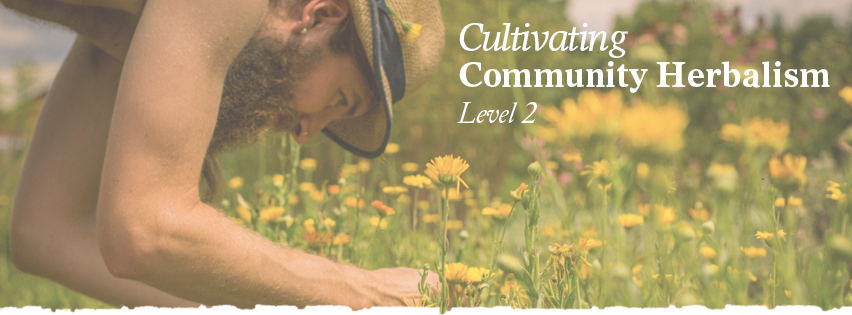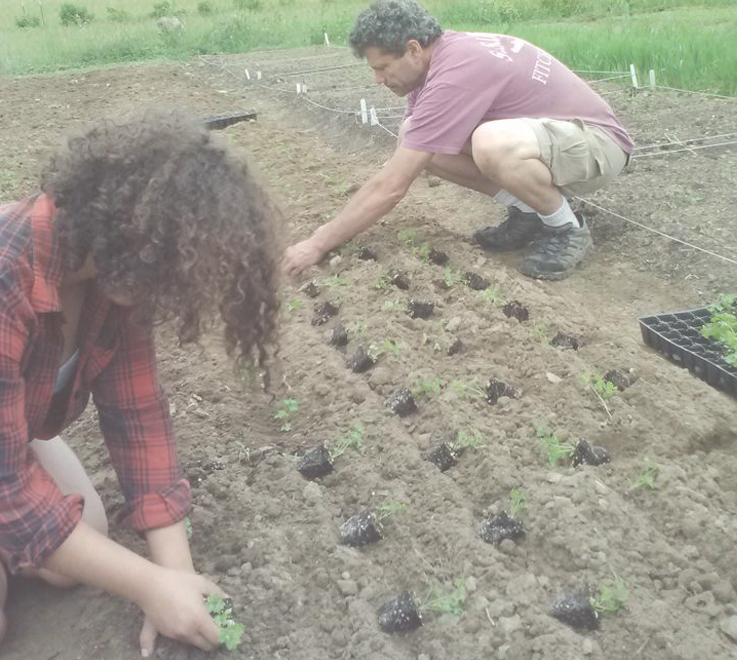


Herbalist classes for Clearpath students who have completed the first level of courses through the Cultivating the Healer Within program
Cultivating Community Herbalism: Building upon first-level courses, Cultivating Community Herbalism interweaves tools and knowledge of Western, Chinese and Native American healing traditions and herbs to explore major health issues of our culture and time. The year-long flagship course offers essential skills and training for caring for and educating others about their health, and developing skills to become active community herbalists.
All herbalist classes for Cultivating Community Herbalism are held in Western Massachusetts.

Pre-requisites for Second-Level Program: Students must complete First-Level requirements and have an interview before being admitted to Second Level. Second Level Certificate Program Requirements: Students following the certificate program track must successfully complete the following courses to become eligible to move on to the Third Level:
Level 2 Curriculum | Cultivating Community Herbalism
 Principles and Practice of Herbal Medicine:
Principles and Practice of Herbal Medicine:
Available to certificate path students at the Second Level: Cultivating Community Herbalism: A year-long class, meeting 11 full Saturdays, and 10 three-hour study group sessions, providing an in-depth, comprehensive exploration of human health and herbal medicine, building on the First-Level program, Cultivating the Healer Within. The Principles and Practice of Herbalism is the flagship course for the Second-Level program, Cultivating Community Herbalism. It interweaves Western, Native American, and Chinese healing traditions while investigating major health and wellness concerns of our time from an herbal, holistic perspective. The intent of this course is to provide the framework, tools and knowledge necessary to enable aspiring practitioners to become active community herbalists. Topics covered:
- Health intake and diagnostic skills
- Ethics, Bedside Manner, Communication Skills
- Creating Wellness Programs
- Devising Herbal Formulations
- Expanding Herbal Knowledge
- Self-Investigation and Sensory Awareness Skills
- Nutritional Theory
Health Areas:
- Lyme Disease, Chronic Fatigue, Candida, Multiple Sensitivities, and other Chronic Illnesses;
- Cancers, Autoimmune Disorders, Endocrine Disorders;
- Diabetes, Metabolic Syndrome, Cardiovascular Health and Blood Health
- Gastro-Intestinal, Digestive, and Liver-Gallbladder Health
- Muscular-Skeletal and Skin Concerns: Arthritis, Injury, Chronic Rashes
- Respiratory System: Allergies, Asthma, Acute and Chronic Illness;
- Nervous System: Anxiety-Depression, Stress and Trauma, Pain and Sleep Disorders, ADD, Age-related Disorders.
- Reproductive and Genito-Urinary Health: Life Transitions, Pregnancy and Childbirth, Menstruation, Menopause, Libido, Prostate Health,
- Children’s Health and First Aid
![]()
 Materia Medica:
Materia Medica:
Medicinal herbal knowledge at the depth & breadth of experienced herbalists A Materia Medica course consists of three classes, each three hours long. Four Materia Medica courses run each year. Available to general public. Required of certificate path students at all three levels. Five herbs of Western and Asian herbal traditions, traditional and modern uses, scientific and folkloric wisdom
- Plant Description, Location, Parts Used, Gathering Times
- Tastes, Energetics, Chemical Constituents
- Medicinal Uses: Western, Chinese, and Indigenous traditions
- Cautions, Contraindications, Interactions
- Preparations and Dosages
 Diagnostic Skills:
Diagnostic Skills:
Taught by Chris Marano and Clearpath Herbal Teaching Staff, this course helps in strengthening the herbalist’s toolkit through essential diagnostic skills. These individual classes are designed to help students sharpen their skills in non-invasive diagnosis. Available to Third Level certificate students and to qualifying advanced students of herbalism and health-care practitioners. Type of diagnostics include: Tongue Diagnosis, Pulse Diagnosis, Face and Physiognomy Diagnosis, and Self Diagnosis Taught. Students must take one diagnostic skills class.
 Herbal Preparations:
Herbal Preparations:
Students must complete two herbal preparations classes. These classes will be introductions on how to make tinctures, oils, and salves. (Indoor half-day classes)
 Wildcrafting Immersion:
Wildcrafting Immersion:
For a morning or afternoon, join a team of herbalists in action, directly experiencing what wildcrafters do and how they do it. Herbalist Chris Marano and the Clearpath Herbals crew invite you to participate in this experiential wildcrafting wisdom immersion — learning, working, having fun, engaging in a valuable community service, side-by-side with those who do it every day. Students must participate regularly during the wildcrafting season. (Outdoor and ongoing from April to November)
 Seasonal Habitat, Sensory Awareness Walks:
Seasonal Habitat, Sensory Awareness Walks:
(Taught by Chris Marano and Clearpath Herbal Teaching Staff) Open to general students. Required of certificate program students at all levels. These three-hour walks are part of Clearpath School of Herbal Medicine’s On-going Courses. Students benefit from having two or more teachers on every walk. The walks are geared toward understanding plants in their natural environments, each one focusing on a different season, each one focusing on one or two ecosystems.
These walks include: Plant Identification, Language of Plants, Natural History, Sensory Awareness Skills, Quiet Time, Science, Folklore, Stories and Anecdotes
 Plant Attunement:
Plant Attunement:
This class is an invitation to students who wish to deepen their connection with plants, through individual and shared experience, interacting in a safe container with committed students of herbalism. During each class we will attune with two plants and share our experiences as a group. Students must attend at least half of the yearly scheduled classes. (Outdoor and indoor class offered once per month).
 Clearpath Gardens:
Clearpath Gardens:
The gardens are, and always will be, a work in progress. The plants let us know if they are happy or not, and we are always experimenting with new arrivals using environmentally sound and sustainable methods. And, along with a good number of wildcrafted herbs, the plant medicines from our gardens make up a large part of the Clearpath Herbals’ apothecary. Students must regularly attend group garden work day during the growing season (April-October).


